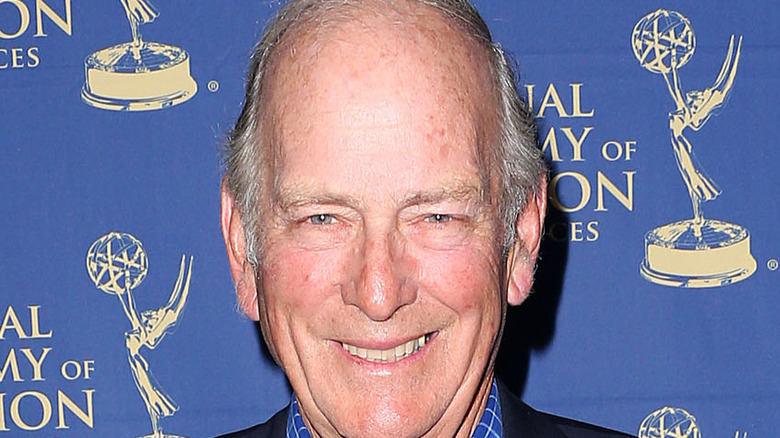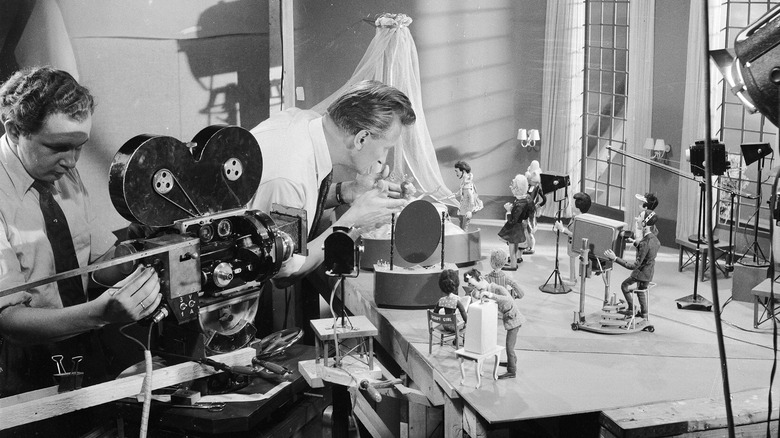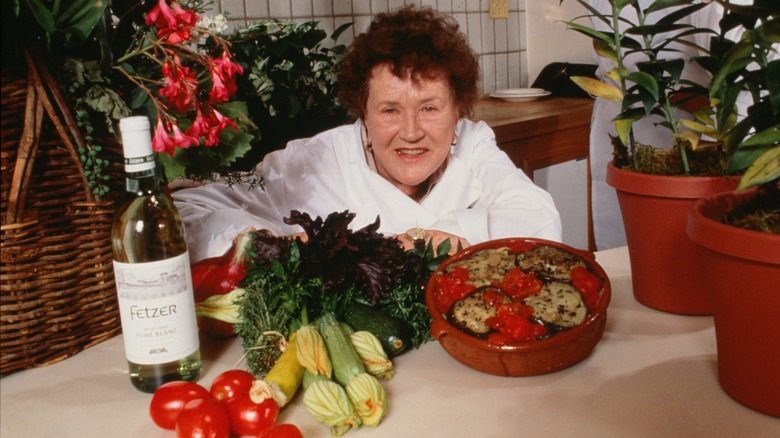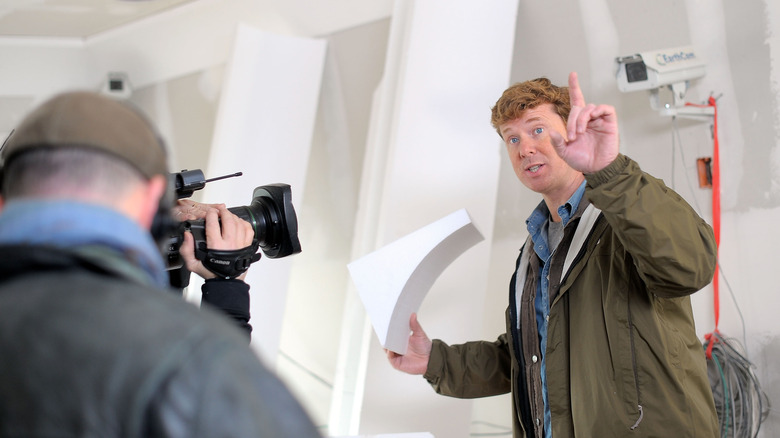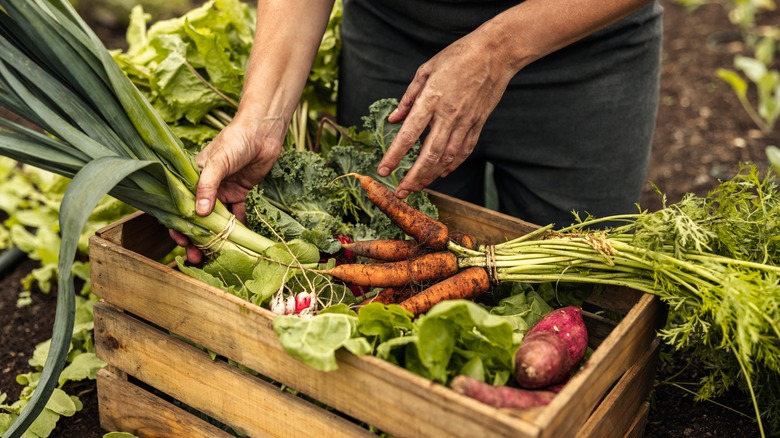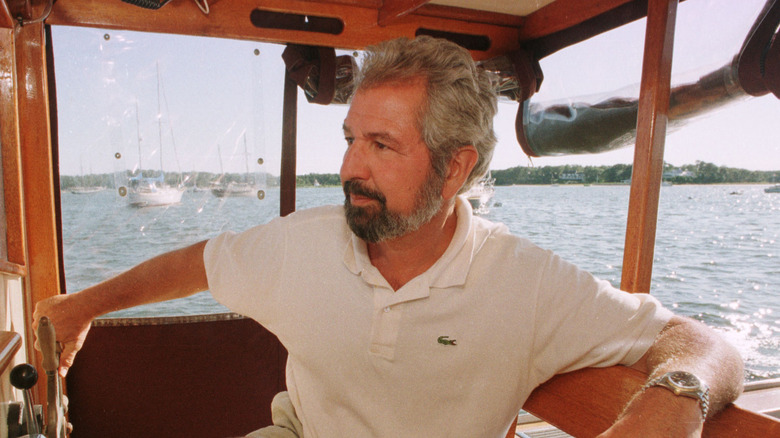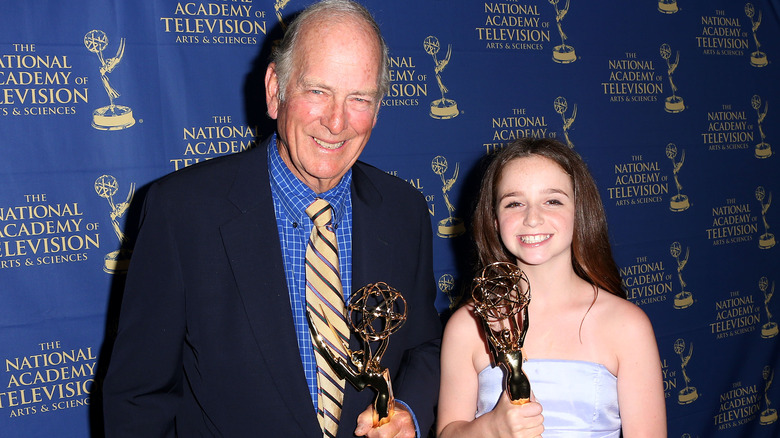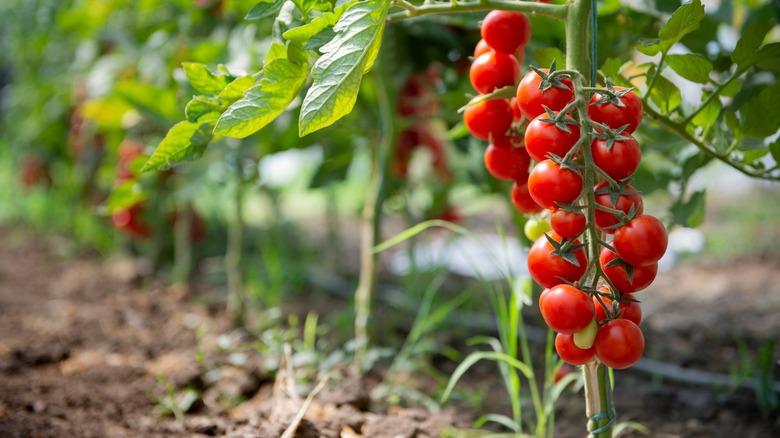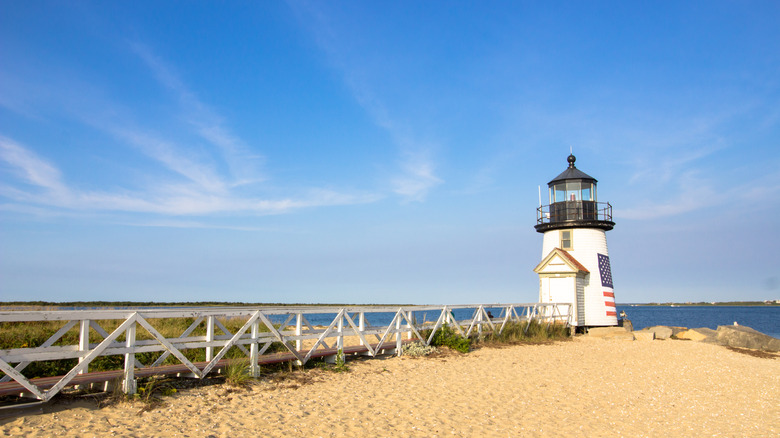The Untold Truth Of Russ Morash
Russell "Russ" Morash, the father of the Do It Yourself (DIY) movement, grew up in Massachusetts, the child of a long line of carpenters and shipbuilders. He was a child of the Great Depression (via Yankee Magazine), which plagued the United States from 1929 to 1939. He was raised with an attitude of "eat everything on your plate; use it up till you wear it out or do without." This included everything from your home to the garden to your kitchen. This dedication to self-reliance would follow Morash through his life and working career, and define his legacy.
Russ Morash is a simple man of humble beginnings who changed the way we watch television and even how we view our own homes. Without him, there would be no HGTV, Magnolia Network (formerly the DIY Network), Food Network, or Cooking Channel. There may never have been a Julia Child or Bob Vila! (More on them below.) Imagine a life without celebrities like Chip and Johanna Gaines or phenomenons such as the "Great British Baking Show." DIY television programming as we know it today simply would be unrecognizable without his contributions.
So let's dive in and learn the truth about this incredible television icon.
Morash earned a Bachelor of Fine Arts degree from Boston University
In 1957, Russ Morash graduated from Boston University with a Bachelor of Fine Arts degree. He had actually been studying how to become a theater director, as television was still in its infancy at that time.
The vast majority of Americans were still watching programs on black and white TVs. Color TVs would not begin to become household items for nearly another decade. So for a person of Morash's age, a theatrical pursuit made better sense. He had already been involved in theater productions as a high school student.
However, after college, Morash turned down an assistant stage manager position in New York City in preference of becoming a production assistant at WGBH in closer-to-home Boston. Television at the time was very similar to theater in the way it was performed, but the talent often wasn't as well trained (via Oldways). Morash saw working in the budding field of television as a way to make his mark. He was also dating someone at the time, and if he stayed in Massachusetts, he could stay close to his sweetheart.
He started out as a camera operator
When Morash first started at WGBH, he was "basically taught to run a camera" as he put it (via Wicked Local). He elaborated in Yankee Magazine in 2016, "I pushed around one of these refrigerator-sized cameras with all the lenses and so forth." Within a year, he was offered a promotion to become a director and producer, an opportunity that he seized.
One of the first shows that Morash worked on was a live children's television program that aired five days a week in one-hour increments called "Ruth Anne's Camp." He also directed episodes of a science-focused program called "Science Reporter." It was when he was asked to produce a new kind of show that focused on teaching the audience at home how to cook called "The French Chef" that Morash stepped foot on the path to television greatness.
"This was assigned to me. It's not like it was something I was burning to do," Morash told Wicked Local in 2014. But he did learn a lot! And put it to good use over the rest of his career.
He was a true visionary who launched a new genre of television
In 1962, four years into his time with WGBH, Morash was introduced to cookbook author Julia Child. Child was a guest on the WGBH show "I've Been Reading," promoting her book "Mastering the Art of French Cooking." It wasn't long before the two were collaborating on a new TV show, "The French Chef."
This was a new kind of program for both WGBH and the U.S. Said Morash, "One of our innovations was to use a mirror over Julia's countertop so viewers could see what she was seeing. ... If you're teaching people how to cook and what to look for, you'd best focus on what's in the pot," Morash told WGBH. The show was taped live in half an hour.
In 1975 Morash created "The Victory Garden," a DIY gardening show that taught viewers how to care for a home garden (via WGBH). A year later Morash put out "This Old House," the first and one of the most iconic home renovation programs. "Who could have imagined that the home improvement television idea would develop into an entire industry," Russ Morash said (via This Old House).
Without Russ Morash, there may not have been a Julia Child
One day while Morash was working at WGBH, he picked up the phone and heard the most unique voice he had ever heard. "It sounded like someone who was a two-pack-a-day smoker filtered through Tallulah Bankhead," he told Colonial Times Magazine in 2009. "This was no mere mortal."
Julia Child was calling the station to let them know that she would need a hot plate for her upcoming appearance on the show "I've Been Reading." She brought along her own pan and eggs from home and used the hot plate to make an omelet for the host on air. The segment was so popular that Child was offered her own cooking show.
Unfortunately, their studio had recently burned down, and Morash had been using an old Trailways bus as a mobile control room. Because he was one of only a handful who knew how to operate the bus, Morash was chosen to direct "The French Chef" (via Colonial Times Magazine). The crew used a temporary kitchen located in the auditorium of the Boston Gas Company for two days before moving to a demonstration kitchen at the Cambridge Electric Company.
Despite several technical setbacks, the show aired for 10 years on WGBH, and Russ Morash directed each episode. Morash attributes the show's success to Child's charisma and love of what she was doing. The pair worked together on various television programs for 30 years (via WGBH).
Professionals worried Morash would ruin their businesses
Morash's influence was hardly limited to the food world. "This Old House" was another pioneering show created by Morash that launched in 1979. The premise of the show was to teach viewers how to renovate and repair an older home. It featured real-life homeowners, contractors, and tradesmen.
But if homeowners learned how to do these things themselves, some contractors worried, they would no longer need professionals. Would this show put people out of a job? One of the show's master carpenters, Norm Abram, said in Entrepreneur that he often heard from fellow tradespeople who questioned him why the show was giving away trade secrets. Abram felt it was just "people being insecure."
On the flip side, some people, including Morash's father, were concerned about choosing to put regular people on television. "I said, 'Dad, I'm not asking them to quote Shakespeare. I want them to tell me, in their own way, how to lay an oak floor, what tools to use, what goes on in their mind," said Morash (via Country Living). Morash believed that the best person to explain these things was the person whose job it was to do them, not a paid actor.
The show was an immediate success, is still on TV today, and laid the groundwork for countless DIY shows to come.
The Victory Garden first took root in a parking lot
During both World Wars, civilians and military alike suffered food shortages. One response to meet these demands was for individuals and communities to plant Victory Gardens. All manner of vegetables were grown. When Russ Morash was a kid, his family had their own victory garden that he was in charge of watering.
Morash wanted to have a vegetable garden in his Lexington home with his wife, but he "was a terrible gardener" who "wanted to learn" (via Yankee Magazine). WGBH had yet to air a gardening show, so Morash brought his idea for the new program to them. Cameras at the time, however, were much more difficult to operate and less mobile than they are today, and Morash was met with skepticism regarding the gardening idea.
In order to keep the shooting site close to the studio, as well as keep costs low, they dug up a neighboring parking lot and purchased a greenhouse. Thus "The Victory Garden" was born from that parking lot.
There was bad blood between Bob Vila and This Old House
Bob Vila was no ordinary talent when he was hired to become the first host of "This Old House," a position he held for the first 10 seasons. In 1978, Better Homes and Gardens awarded Vila a Heritage House award for the renovation work he had done on a Massacussetts' Victorian Italianate home.
As host of an Emmy award-winning show, Bob Vila quickly gained celebrity status, even making cameo appearances as himself on the 1990s sitcom "Home Improvement." Because "This Old House" was on PBS, effort was put into not showing preference to any particular brand (via Tedium). The show's budget was also low, and Vila made only between $200 and $800 per episode, making it more of a side job than a career.
Vila decided to capitalize on his fame by becoming a spokesman for different brands, such as the now-closed home-improvement chain Rickel. This upset the underwriter for "This Old House," Home Depot, and Vila was asked to drop his sponsorship deal. When he refused, he was fired.
Vila didn't waste time feeling sorry for himself. "I was able to re-create myself and my production company, and carried on with what I'd tried to do for those 10 years on the show," Vila said in Chron.
Russ Morash married a James Beard Award-winning chef
Russ Morash met his wife Marian while they were both working in the theater department at Boston University in 1955. "I saw this really quite good looking fellow and I thought, Hmm, I wonder who he is," said Marian in Oldways. "I made sure I got introduced, and well, that was that."
After they both graduated in 1957, Morash decided to remain in Boston rather than accept a job in New York City partly to stay close to Marian. The two were married in 1958. Through Morash's work with Julia Child, Marian expanded her cooking repertoire. She became such a skilled cook that her husband invited her to be the resident chef, as Chef Marian, on his show "The Victory Garden," showing viewers what they could make with the vegetables they had grown. She appeared on the show for 25 years.
She also operated the Straight Wharf Restaurant, one of the few restaurants at the time to employ only women in the kitchen. It was fine for a woman to cook at home, but a woman chef in a restaurant kitchen was a different matter! While at the Straight Wharf, in 1984, Chef Marian was given the James Beard Who's Who of Food and Beverage in America Award.
Chef Marian has also authored two cookbooks, "The Victory Garden Cookbook" and "The Victory Garden Fish and Vegetable Cookbook."
Russ Morash has won several awards throughout his career
Russ Morash was nominated for his first Emmy in 1972. It wasn't until over a decade later, however, that he would win his first in 1986 for "This Old House." This would not be the show's nor Morash's only win. Over the course of his long career in television, Morash has won a total of 14 Emmy awards. Eleven were for Outstanding Director of a Service Show (via This Old House). In 2014, Morash received a Lifetime Achievement Award from the National Academy of Television Arts and Sciences. While honored by these accolades, Morash is also humble. He told Wicked Local, "You don't make TV shows that we do to win awards."
While all of the shows that Morash worked on were personal in some way, "The Victory Garden" in particular was his "baby." After Morash's retirement, "This Old House" continued on to win Emmy awards, currently claiming 20 Emmys, including its own Lifetime Achievement Award in 2022. "The Victory Garden" also continues to air.
A number of Morash's shows were filmed literally in his backyard
In 1975, Morash and his wife Marian purchased a farmhouse in Massachusetts that had been built in 1851 (via Los Angeles Times). In the aftermath of the 1970s energy crisis, which drastically raised the price of gasoline and other costs, Americans were learning to live more frugally. Having learned from his own childhood, Morash saw a way to help. "Americans did not know where anything came from. They did not know that potatoes came out of the ground or that eggplant, celery, and lettuce could be grown from seeds. And I said you know what we really need is a mentor who can teach us gardening" (via DesignNews). Thus the concept for "The Victory Garden" came about.
But after the first few seasons, the program moved out of its parking lot filming location and into Morash's own backyard. A new segment was added to the show as well, featuring Morash's wife as Chef Marian who showed viewers how to cook their homegrown vegetables from her own farmhouse kitchen (via Sighs and Whispers).
Another of Morash's shows for WGBH, "The New Yankee Workshop," a spinoff of "This Old House," was also filmed on location in Morash's woodshed. Talk about living frugally!
He was inducted into the Massachusetts Broadcasters' Hall of Fame
As if it weren't enough, Russ Morash has achieved more in life than spawning an entirely new genre of television and winning a slew of Emmys. (On the list of Top 100 Daytime Emmy Award winners, Morash is 12th). In 2018, Morash was inducted into the Massachusetts Broadcasters' Hall of Fame in celebration of his contributions.
Recommendations are made by the public and from within the broadcasting community throughout the course of a year. The Induction Sub-Committee meets and votes on them in November before passing them on to the Hall of Fame Committee for their review. The Massachusetts Broadcasters Association then receives and reviews the candidates for ultimate approval. So to make it through all of these layers is quite an honor. But there is no denying Morash's many contributions to broadcasting through the past 50 years, all built from the small WGBH public broadcasting studio in Boston, Massachusetts. And Morash's backyard of course.
He was made Chair in Childhood Horticulture at the Nantucket Lighthouse School
Russ Morash may be retired, but he is far from sitting back on his laurels. For years, he has worked with the Nantucket Lighthouse School located in Nantucket, Massachusetts by leading workshops and influencing new generations of gardeners. He currently serves as the school's Chair in Childhood Horticulture and acts as an advisor to the Horticulture Teacher.
For Morash, it's all about educating children on where their food comes from. "Starting children on a path understanding how a garden works is noble work indeed for it is fundamental to a healthy life and a healthy planet," he said in regards to his position with the school (via Nantucket Garden Festival). "Knowing and growing plants you can eat or enjoy simply for their beauty throughout a lifetime of observation is just one more joy a gardener knows well although no one ever knows them all."
The Nantucket Lighthouse School teaches children through discovery and seeks to cultivate a sense of global responsibility, emotional maturity, compassion, and discernment through its integrated curriculums of multiple disciplines. It would seem to be the perfect cap to Morash's long life of learning and self-sufficiency.
